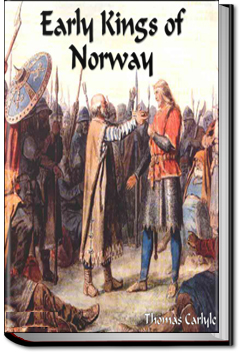“The Icelanders, in their long winter, had a great habit of writing; and were, and still are, excellent in penmanship. It is to this fact, that any little history there is of the Norse Kings and their old tragedies, crimes and heroisms, is almost all due. The Icelanders, it seems, not only made beautiful letters on their paper or parchment, but were laudably observant and desirous of accuracy; and have left us such a collection of narratives (Sagas, literally “Says”) as, for quantity and quality, is unexampled among rude nations. Snorro Sturleson’s History of the Norse Kings is built out of these old Sagas; and has in it a great deal of poetic fire,. . . and deserves to be reckoned among the great history-books of the world. It is from these sources that the following rough notes of the early Norway Kings are hastily thrown together.”
Hakon's
subjects and merchants that frequented him, were naturally in quarrel;
and frequent fightings had fallen out, not generally to the profit of
the Jomsburgers, who at last determined on revenge, and the rooting out
of this obstructive Hakon Jarl. They assembled in force at the Cape of
Stad,—in the Firda Fylke; and the fight was dreadful in the extreme,
noise of it filling all the north for long afterwards. Hakon, fighting
like a lion, could scarcely hold his own,—Death or Victory, the word on
both sides; when suddenly, the heavens grew black, and there broke out
a terrific storm of thunder and hail, appalling to the human
mind,—universe swallowed wholly in black night; only the momentary
forked-blazes, the thunder-pealing as of Ragnarok, and the battering
hail-torrents, hailstones about the size of an egg. Thor with his hammer
evidently acting; but in behalf of whom? The Jomsburgers in the
hideous darkness, broken only by flashing thunder-bolts, had a dismal
apprehension that it was probably not on their behalf (Thor having a
sense of justice in him); and before the storm ended, thirty-five of
their seventy ships sheered away, leaving gallant Bue, with the other
thirty-five, to follow as they liked, who reproachfully hailed these
fugitives, and continued the now hopeless battle. Bue's nose and lips
were smashed or cut away; Bue managed, half-articulately, to exclaim,
"Ha! the maids ('mays') of Funen will never kiss me more. Overboard, all
ye Bue's men!" And taking his two sea-chests, with all the gold he had
gained in such life-struggle from of old, sprang overboard accordingly,
and finished the affair. Hakon Jarl's renown rose naturally to the
transcendent pitch after this exploit. His people, I suppose chiefly the
Christian part of them, whispered one to another, with a shudder, "That
in the blackest of the thunder-storm, he had taken his youngest little
boy, and made away with him; sacrificed him to Thor or some


